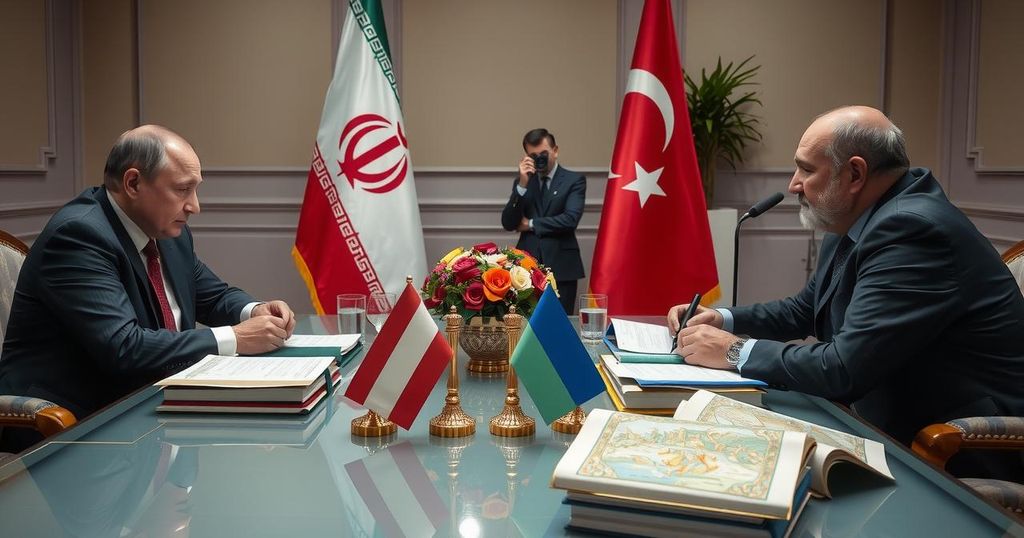Turkey, Russia, Iran to Discuss Syrian War Amid Rebel Advances

Turkey, Russia, and Iran will meet in Qatar this weekend to discuss responses to recent rebel advances in Syria, particularly involving the Islamist group HTS’s seizure of Aleppo. The discussions will occur during the Doha Forum and focus on the ongoing conflict and potential political solutions. The U.S. also remains concerned about the implications of ISIS’s resurgence amid these developments.
Turkey, Russia, and Iran are poised to convene this weekend in Qatar to formulate their strategy in response to a significant rebel advance within Syria’s protracted civil conflict. This meeting will occur on the margins of the Doha Forum, which serves as a platform for discussion among senior officials, academics, and business leaders from over 150 countries. According to an official from Turkey’s foreign ministry, Foreign Minister Hakan Fidan is scheduled to engage in discussions with his Russian and Iranian counterparts under the auspices of the Astana process, which was established to seek a political resolution to the Syrian crisis.
The Astana process, initiated in 2017 by Russia and Iran in cooperation with Turkey, aimed to stabilize the situation in Syria post-civil war. Following the ceasefire brokered by Russia and Turkey in 2020, the Assad government maintained control over major cities and approximately 70% of the territory. However, the recent offensive by the Islamist group Hayat Tahrir al-Sham (HTS) has led to the capture of Aleppo, Syria’s second-largest city, and a push towards Hama and Homs, challenging government control in these regions.
In light of these developments, Russian President Vladimir Putin recently communicated with Turkish President Recep Tayyip Erdogan, emphasizing the urgency of ceasing aggression against the Assad regime. While Turkey maintains its support for Syria’s territorial integrity, it advocates for a political engagement from the Assad government. Turkey also continues to bolster the Syrian National Army, a faction that opposes the U.S.-backed Syrian Democratic Forces (SDF), which predominantly comprises Kurdish fighters.
As fighting escalates between opposing factions, there are growing concerns regarding the potential resurgence of ISIS amid the chaos. The United States remains vigilant as it continues to support the SDF’s efforts against ISIS. Although the control of Aleppo may not significantly impact U.S. strategic interests, the potential for increased refugee flows and instability in the region raises alarms. Consequently, rapid restoration of a ceasefire could facilitate the return of displaced Syrians from Turkey.
In summary, the complexities surrounding the Syrian civil war continue to evolve as Turkey, Russia, and Iran seek to address current tensions brought about by the HTS offensive. The outcomes of the upcoming talks may have far-reaching implications for the regional balance of power and the humanitarian situation in Syria.
The ongoing Syrian civil conflict, which began in 2011, has seen various factions vie for control over different areas of the country. The interests of international players such as Turkey, Russia, and Iran have significantly influenced the trajectory of the conflict. Turkey supports certain rebel factions while opposing Kurdish forces, which it associates with terrorism. In contrast, Russia and Iran ally with the Assad regime, aiming to sustain its foothold in the region. The Astana process is one of the mechanisms established by these nations to seek a peaceful resolution to the conflict, but the landscape has changed dramatically with recent military developments.
The impending talks between Turkey, Russia, and Iran in Qatar represent a critical juncture in addressing the new dynamics introduced by the HTS offensive in Syria. As the balance of power shifts, it will be imperative for these nations to navigate their divergent objectives while aiming for a resolution that staves off further conflict and allows for the potential return of Syrian refugees. Maintaining stability in Syria is not only crucial for its people but also for the regional security landscape.
Original Source: www.voanews.com







